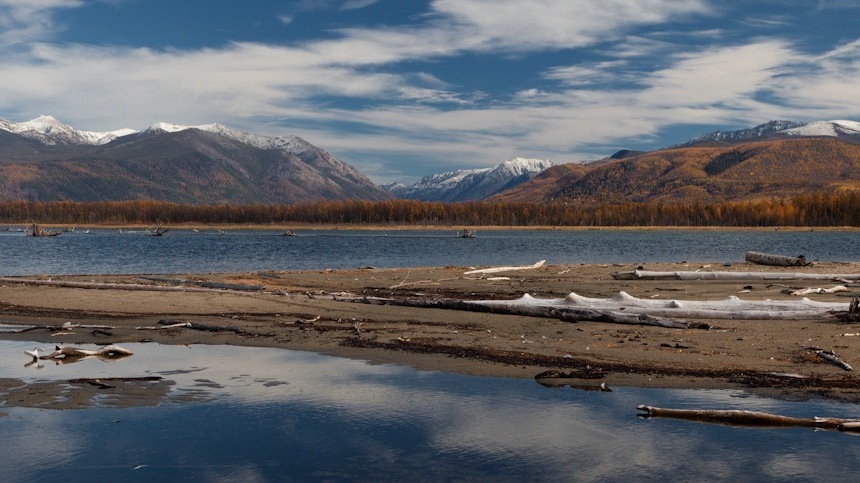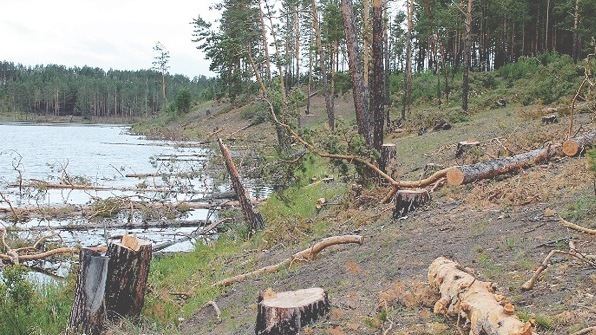Posted 19 июля 2023, 20:51
Published 19 июля 2023, 20:51
Modified 20 июля 2023, 06:05
Updated 20 июля 2023, 06:05

Baikal is not enough for everyone: how the ecology of the lake suffers because of the tourists
Yelena Petrova
Russian social networks have long had hundreds of offers to relax on Lake Baikal. After February 2022, commercial tourism has been added to the enthusiasts who attract tourists with ecotropes. There are many tours offered for every taste. A week's rest will cost at least 60 thousand rubles per person. The cost of plane tickets should be added to the cost of your stay. And they bite. If at the end of July you can still meet 30 thousand, then in August they are already worth 43 thousand. Whether it will still be. If you can fly to Turkey now for 163 thousand per person per week, then no one will go so far East for 7 days. And then a vacation for 10 days on Lake Baikal will equal the price of a week in Turkey.
Sergey Romashkin, Vice-president of the Association of Tour Operators of Russia, cautiously suggested that it had become crowded on the Irkutsk side of Lake Baikal, so it was necessary to develop the eastern, Buryat shore of the lake.
In reality, the number of tourists that Baikal can receive was already exceeded 5 times last year, says the scientific director of the Institute of Water Problems of the Russian Academy of Sciences, Corresponding member of the Russian Academy of Sciences, Doctor of Sciences, Professor Viktor Danilov-Danilyan:
— The permissible limit of tourists was exceeded at least five times last year! The infrastructure of the Baikal region was able to withstand five times fewer tourists than arrived there. And a million and a half arrived last year! And this year — even more.
While tourists are littering the west coast, and the tourism industry is trying on Buryatia, another danger threatens the ecology of the deepest lake in the world and one of the largest reservoirs of fresh water on the planet, much more severe than even the crowds of littering people on the shores of Lake Baikal, sacred to Buryats.
«By the lake 2.0»: only deputies are worse than tourists
The struggle for the preservation of Lake Baikal has a long history. Soviet director Sergei Gerasimov, whose name is named after VGIK, made a film in 1969 with Vasily Shukshin and Natalia Belokhvostikova about the conflict between scientific and technological progress and the preservation of the pearl of nature. Then a pulp and paper mill was being built, and deforestation threatened the existence of Lake Baikal. For several decades, environmentalists have been fighting for the preservation of the unique Baikal nature. In 1999, at the end of Yeltsin's time, the law «On the protection of Lake Baikal» was adopted. It seemed that reason had prevailed over greed and stupidity. But it wasn't there. Lobbyists from various sectors of the economy — from the same paper or aluminum manufacturers to railway builders — have been trying to give their commercial interests a legislative basis year after year. Conservationists, as they could, discouraged walkers. But now the oligarchs, who have nowhere to invest money abroad, have rushed to build tourist complexes in the most unique places of the country. Deputies are also people, who can resist temptations. The State Duma in the first reading adopted a bill that permits continuous logging in the central ecological zone of Lake Baikal. Professor Danilov-Danilyan is aware of this outrage:
— There was the first reading at the subcommittee of the Committee on Natural Resources and Environmental Protection. It doesn't happen that fast, thankfully. But this is the second attempt, the second bill. The first option was considered, discussed, passed the first reading. Instead of submitting it with amendments for the second reading, in violation of regulatory norms, a new bill was submitted, although repeating the old one. All this threatens to destroy the ecosystem of both the terrestrial, the Baikal region, and the ecosystem of Lake Baikal itself.
The authors of these bills want to allow the construction of roads, sewage treatment plants, hotels, restaurants and toilets on the shore of Lake Baikal. All this is done under the slogan «Life does not stand still», as the first deputy chairman of the parliamentary committee on property issues Sergey Ten presented the new law to deputies.
According to the authors of the bill, instead of last year's 1.5 million, 6 million people will come to rest until 2030 annually. Thus, the load on the lake will increase by 20 times! Oleg Mikhailov, a member of the Ecology Committee, estimated that 600 hectares of forest should be cut down for this.
This means the destruction of the terrestrial ecosystem of Transbaikalia and the ecosystem of Lake Baikal itself.
Algae, phosphorus and climate change
At the geography lesson, everyone teaches that many rivers flow into Lake Baikal, and one flows out — the Angara. If the forests in The Baikal region will be cut down in a barbaric way, the flow of these rivers will be significantly reduced. Rivers serve as natural filters for mud. It will flow into Lake Baikal, which will lead to the death of all food chains.
Since 2014, scientists have observed 5 low—water years, and for the first time in the entire history of observations, Baikal «bloomed» — green algae appeared in shallow water — filamentous spirogyra, said Danilov-Danilyan:
— It is very far from the well-known blue-green cyanobacteria, but the result is about the same. Explosive growth during dry hot years. The water level has actually dropped to the limit. There is a range of about a meter, so it fell to the lower limit. The water warmed up well, and the spirogyra, which, apparently, has always lived there, is not some kind of invasive species, there was no introduction, but it just began to multiply explosively. There were the same pictures as on the Volga reservoirs or on the Tsimlyansk reservoir on the Don, when the surf literally brings to shore a layer of thirty centimeters of dead spirogyra.
There were two reasons for this: hot summer and falling water levels and phosphorus pollution. Phosphorus enters Baikal water with effluents that are not cleaned at all. Nitrogen flows into the water together with phosphorus. It also promotes the reproduction of spirogyra.
Baikal without omul
In Baikal there is a fish that exists only here — the Baikal omul of the genus of whitefish of the salmon family. There are two versions of its origin. According to the first, the omul penetrated to Lake Baikal through rivers from the Arctic Ocean, where oceanic omul is found, during the interglacial period. Another version says that the Baikal omul is an ancient fish, it originated from an ancestral form that lived during the Oligocene and Miocene. This small fish is up to one and a half kilograms 30-60 cm long, although there are also specimens up to 7 kg. The peoples who settled along the shores of Lake Baikal gave their names to each subspecies that lived in different areas of the lake. Omul is threatened with destruction. It feeds on the epishura crustacean, which disappears under the influence of water pollution.
— In 50 years, nothing good will remain of Baikal. It will be a very deep, dirty lake with a lot of water, in which all sorts of rubbish like spirogyra will live. But not omul. The main link of all trophic chains — the epicureus — will die out without a trace. This is a Baikal endemic, not found anywhere else, such, what is called, the keystone in the entire structure of the Baikal ecosystem. Nothing good can be expected here, » the scientist says.

Will UNESCO impose sanctions?
Baikal itself, according to Russian legislation, is not included in the number of specially protected areas, but there are reserves on it, there is a national park that have this status. But Baikal is a UNESCO World Natural Heritage Site.
Despite this, pollution of the lake occurs constantly.
For example, there are norms for water discharge. They are not executed.
There are diffuse pollution — the so-called runoff from agricultural fields, what is washed into Lake Baikal by rains, when snow melts or in high water.
No one knows how many boats with outboard motors there are on Lake Baikal. They run on diesel fuel and gasoline, and when it burns, the water is polluted.
— I have seen photos when the omul goes to spawn, everyone gathers there in order to catch it, when the fish goes to spawn, it is easiest to catch it. So, there's just no water in sight. Solid boats and speedboats! — says the former minister, and now Professor Danilov-Danilyan.
The UNESCO mission was supposed to arrive in 2022. Due to events in The commission postponed its visit to Ukraine. If the pollution is significant, Baikal will either be excluded from the World Heritage List, which will be a disgrace for the country, or Baikal will be declared a World Heritage site under threat. If the Duma passes a law on continuous logging, Baikal will sooner or later lose its status.
Environmentalists have started collecting signatures for a petition against the bill. The collection of signatures lasts a week, it was signed by 60 thousand people. Just for today, 10 thousand have signed their signature.
Corresponding member of the Russian Academy of Sciences Danilov-Danilyan does not hope that the law will be rolled. At least the first reading passed, and 296 people voted for it, and only 76 deputies voted against it. The first deputy chairman of the State Duma Committee on Ecology, the head of the All-Russian Society for Nature Protection Vyacheslav Fetisov, about whom Viktor Danilov—Danilyan knows that he is against logging, said at the hearing that «no one discussed the bill — neither the scientific community, experts, nor relevant ministries.» It would be good to figure out what will be a benificiar, the deputy said.
«If the project is adopted in this form, we will be the last generation of people who will be able to admire the charms of the lake, » said Anatoly Greshnevikov, co—author of the 1999 law «On the Protection of Lake Baikal.»
Do you think anyone in the Duma cares about this, apart from these 76 people?


